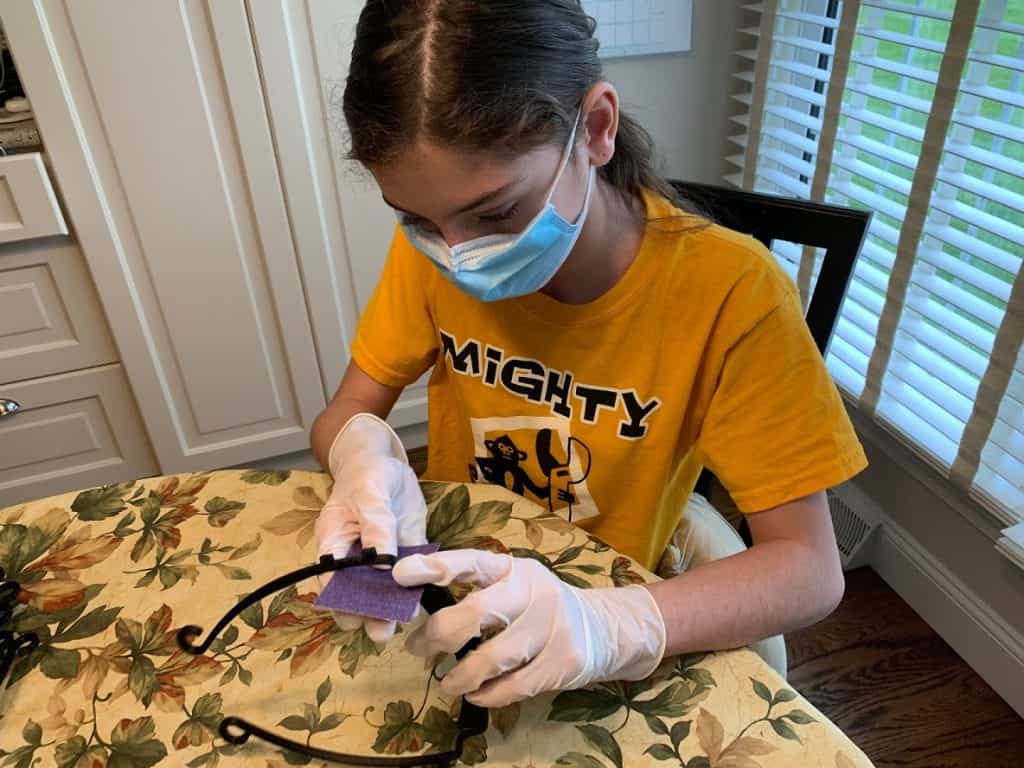

While the COVID-19 pandemic forced cancellation of the FIRST Robotics Competitions (FRC) scheduled for spring, South Jersey’s robotic students are hardly sitting idle.
Students from Moorestown High School, Cherokee High School, Lenape High School and Bishop Eustace Preparatory School are teaming up to put their technology and know-how to use.
Students are 3D printing field shields to protect medical staff and front-line workers from the risk of infection from the pandemic, an initiative they call Project FRC Against COVID-19. Project FRC currently has 3D printers working 24 hours a day, and has dropped off completed face shields directly to Burlington hospital systems as well as to the Burlington Country Medical Relief Corps, who distribute the shields to hospitals.
Maria Blatcher, an advisor with Moorestown Robotics, was inspired to start the project a few weeks ago when she read about a FRC in Michigan printing face shields. She immediately thought Moorestown’s team, the Combustible Lemons, should do the same. So she emailed them asking if anyone who owned a 3D printer wanted to get involved and was immediately met with an enthusiastic response.
The team subsequently emailed friends involved in FRC from other schools. They also recruited younger members of the robotics community, including the Moorestown Robotics Mighty Monkey Wrenches, who are ages 9 to 14 and participate in the FIRST LEGO League.
Through a series of connections, Blatcher linked the students with a Massachusetts-based engineering and robotics teacher who designs face shields. Over Zoom, he advised them on the best ways to create lifesaving gear. From there, they were off and running.
Students handle the equipment while wearing masks and gloves and have a checklist of standards to meet during production. Blatcher said there is no person-to-person contact. When students need more materials, they shoot her an email; her family packages the materials and leaves them outside their home for students to pick up. Conversely, students drop off the completed shields at her home and she delivers them.
“I wanted to get involved because it gave me the opportunity to support local communities through one of my hobbies,” said Daniel Lam, a senior at Lenape High School and director of the Storm Robotics team.
“I may not be supporting people by being on the front lines, but it’s a way for me to do what I can from home.”
Lam said students currently print two different models of shields: the Verkstan and the Looney. He uses the Looney, which prints in about an hour and requires elastic and foam. Once the head piece is printed, he loops elastic through the sides of the 3D print and sticks foam to the front of the shield for comfort. He can assemble and package 40 shields in around two hours.
Other members are using the Verkstan, which prints in less than an hour and has the advantage of being stackable. Members don’t have to check the printer every hour to remove shields and start new prints, and they can just leave the printer running 24 hours. The shields also do not require any elastic or foam for assembly, but the model has a slightly larger footprint and does not fit on the beds of some older printers.
Lam said since the shields may be difficult or time consuming for others to sanitize, the team provides five transparencies (these act as the shields) for each head piece. Since these are three-hole punched, they align with prongs on the headpieces and can be easily attached or removed.
Emily Tsai, a senior at MHS and co-leader of the Combustible Lemons, said for a robotics team, access to 3D printers and the partnerships among multiple groups in South Jersey enable members to make an impact. She said each team has the capacity to help, but together, they can do more.
“Each day, our medical professionals and front-line workers risk their lives to save others,” Tsai noted. “Their work does not stop, even as the supply of PPE runs low.
“This is our way of giving back to all these courageous workers.”
Blatcher said Project FRC Against COVID-19 requests anyone who has a 3D printer and is ready to help get involved. She said the team is ready to share information, resources and training.
The team also asks for help with funding to continue production. The initial production costs were funded by the students themselves. To get involved or to donate, contact Blatcher at [email protected] or donate directly at frcAgainstCOVID19.com.









